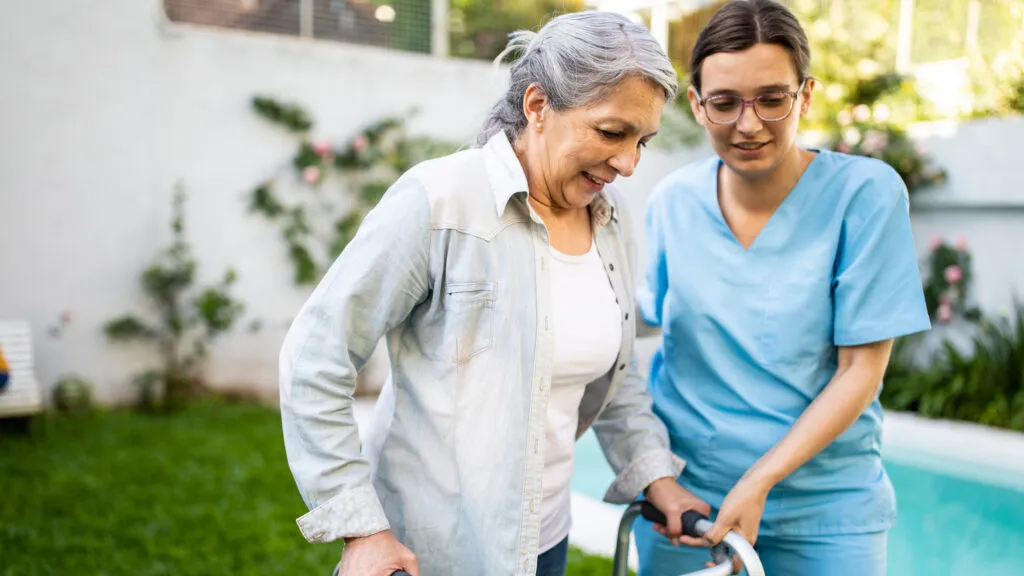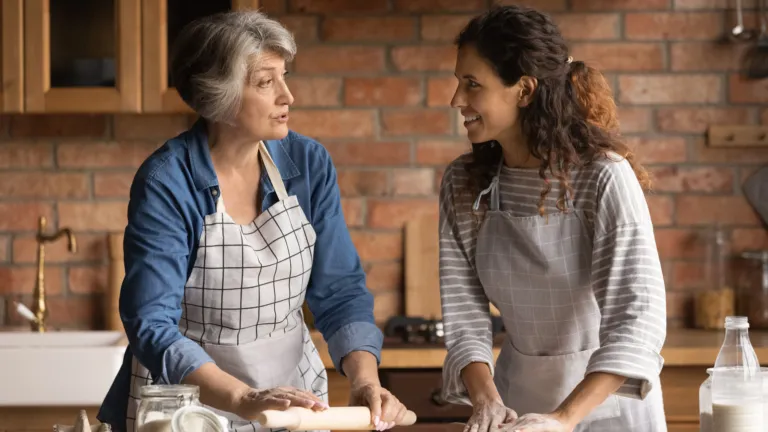If you’ve been the primary family caregiver for a loved one with dementia, you know that it takes a special type of person to do the job well. If your loved one has passed away, it’s possible that you’ve had a desire to apply your caring nature and experience to exploring work as an in-home caregiver. Since this is foreign territory to you, it can help to know a bit about what it takes to be successful at this potentially very rewarding job, and to understand the differences between caring for a loved one at home and caring for someone professionally.
“When we care for our parent or another family member, we have different ways of being because of the whole family history, so it’s one of the things that people have to become aware of—this is not your parent,” Donna Schempp, LCSW, of the Family Caregiver Alliance told Guideposts.org. “As a professional caregiver, you have to establish a relationship, whereas with your parent, you have a relationship already there. Sometimes we think we can just walk right in and do what we did before.”
The most important thing at the outset is to get training in dementia care, Schempp said. This goes for anyone who is considering working as an in-home caregiver, regardless of the level of care the person would be providing. In-home caregivers are responsible for a wide spectrum of services, from being a companion and handling household tasks to providing skilled health care. Agencies generally require and/or offer training. But Schempp said it’s equally important for private caregivers, and even for family caregivers, to get training. “The biggest mistake that people make is they think that they can make it up as they go along and they’ll be successful and it’s not true,” she said.
Schempp suggested checking with your local chapter of the Alzheimer’s Association for information on training and workshops, as well as with a community college in your area. Through classes, you will learn crucial things like transfer skills—how to use your body properly so that you don’t hurt yourself—as well as what issues require medical care or other outside attention, and how to communicate effectively. If you can’t take a class, she said, you can also learn a lot by reading articles on the dementia care.
Dementia care is counterintuitive, Schempp said. “What we tend to do when someone doesn’t want to do something is make our case and explain why it’s important to get dressed right now, or to take a shower, and that doesn’t work with people with dementia. You have to learn how to communicate, how not to just harass or bully somebody.” Good interpersonal skills, an air of levity, the ability to “jolly someone” and a generally positive attitude are important for any dementia caregiver, she said.
Many classes also teach caregivers, prospective or otherwise, how to entertain through reminiscence via photo albums and stories, and about the soothing balm of music, Schempp said. “Sometimes if you can sing to somebody what you want them to do, they’ll be more responsive than if you just tell them. And if you’re singing, you’re going to help your mood too.”
Certain personal qualities are, needless to say, a major component of successful caregiving. Through your experience as a family caregiver, you are no doubt familiar with the all-important role that patience plays in successful interactions. “Patience is probably the hardest—the one quality that’s going to get frayed,” Schempp said. Proper rest, relief and support are crucial to maintaining patience as a caregiver, she said. It also helps to be “self-contained,” she said. “You have to be able to maintain your equanimity or your ability to feel okay without getting it necessarily from the person you’re caring for.”
In addition, the caregiver needs to be a good advocate for the person with dementia. “If you take someone to the doctor, they’re not accurate reporters,” Schempp said. “The doctor’s going to say things like, ‘How are you?’ and they’re going to say, ‘I’m fine’. They’re not going to generally tell you what’s going on, and so the person who’s a caregiver has to tell other professionals kind of what is happening at home and what is different than it used to be.” This means developing a relationship with the person you’re caring for, and paying close attention to behavior and moods. “If you’ve been doing this for your family, things just flow in a certain way and you take all kinds of stuff for granted. But you go to work for somebody else and the same assumptions aren’t there,” Schempp said. “If you have to run errands, for example, can you leave the person for a half an hour or do you have to take them with you everywhere you go? There are just so many little pieces that have to be figured out that no one thinks about until they come up.”
Challenging as it may be, working as a caregiver offers the opportunity to form a close bond with an individual who can benefit greatly from your help, potentially over a period of several years. At the moment, with social distancing measures in place, this can be even more valuable and rewarding. For the right person, Schempp said, “it’s a great job!”
The Alzheimer’s Association has released tips for Dementia Caregivers to deal with Covid-19, both at home and in long-term and community-based settings.
For more information on caregiving, go to the Family Caregiver Alliance website.






